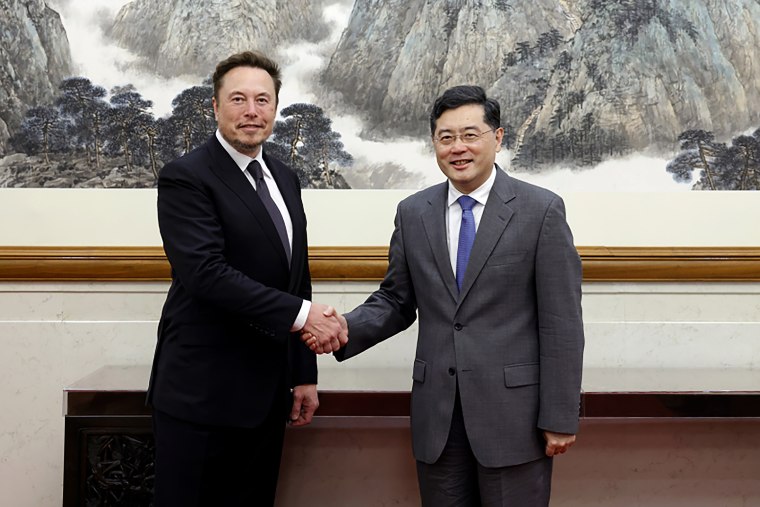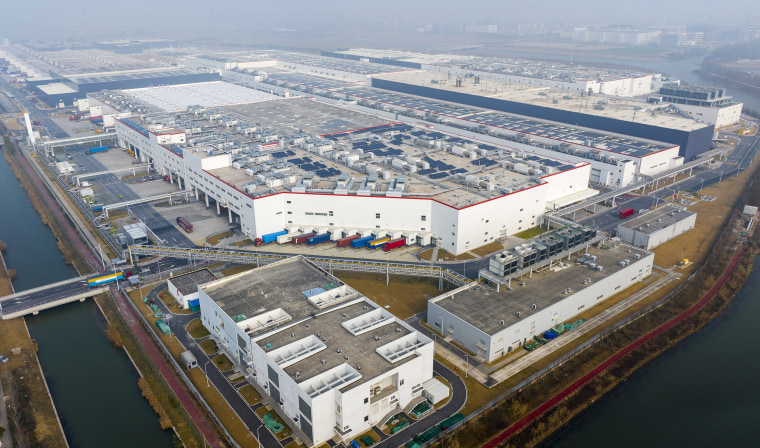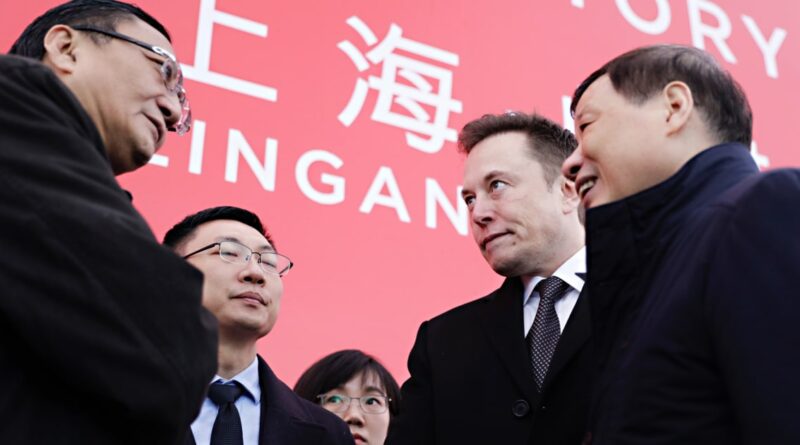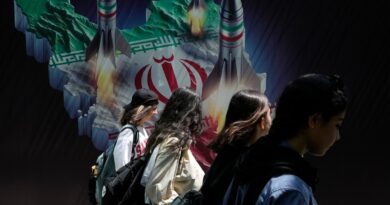Elon Musk’s influence over Trump is being closely watched by Beijing
SHANGHAI — If Donald Trump is elected Tuesday, the former president has said he may be advised by tech billionaire Elon Musk, who has campaigned for him vigorously in recent weeks and donated more than $100 million to his campaign.
That, perhaps more than the presidential race itself, is being closely watched here in China, where the world’s richest man has extensive business interests and the appearance of a tight relationship with Chinese officials.
It can be puzzling for observers: Why would Musk support Trump, who has embraced “decoupling” the world’s two largest economies and vowed even greater tariffs on Chinese imports that in his first term ignited a trade war?
Musk stands to lose quite a bit from decoupling, as well as any increase in U.S.-China tensions, said Jia Qingguo, the former dean of the school of international studies at Peking University.
“I don’t understand why he supports Trump that much because what Trump has advocated is against his own business, at least his business with China,” Jia, who is also a political adviser to the Chinese government, told NBC News in an interview.
The Trump campaign did not respond to a request for comment. He recently told the Wall Street Journal editorial board that Chinese President Xi Jinping respects him but also knows he’s “crazy” and wouldn’t provoke him.
By associating so closely with Trump, Musk risks incurring the wrath of Chinese officials who might see him as aligned with Trump’s policies and a political style seen here as “unpredictable.” Trump has proposed blanket levies of 60% or higher on all goods imported from China, which would hardly be welcome in Beijing as officials try to revive a struggling economy.
But Chinese officials might also see potential for Musk to be a mitigating influence on issues such as tariffs. After saying early this year that Chinese electric vehicle companies would “pretty much demolish” most of their competitors without trade barriers, Musk did a U-turn and said in May that he opposed President Joe Biden’s newly announced tariffs on Chinese EVs.
“There’s a very interesting dynamic there between Musk and China in that he needs them, and he’s trying to pursue business interests there, but they’re also increasingly, in a long-term sense, potentially undermining his business interests,” said Kelly Grieco, a senior fellow at the Stimson Center in Washington, a nonprofit, nonpartisan think tank.
Like other American business leaders, Musk has met with senior Chinese officials as Beijing courts international companies. During a surprise visit to the Chinese capital in April, he met with Premier Li Qiang, China’s No. 2 official.
In a separate meeting in Beijing last year with Qin Gang, the Chinese foreign minister at the time, Musk expressed opposition to “decoupling.”
By publicly criticizing the idea at a time when so many others are loudly calling for it, Musk is playing “an important role” as “a sort of bridge between the two countries,” Grieco said.

If Chinese officials receive Musk almost like a world leader, the Chinese public treats him like a rock star.
“He’s a legend,” said Jennifer Lian, 39, a Tesla owner in Beijing.
Commenters on the Chinese social media platform Weibo, where Musk has 2.2 million followers, have suggested he could be the next Henry Kissinger, the late U.S. statesman and longtime U.S.-China intermediary who was revered in China and had close ties to its ruling Communist Party.
Chinese leaders noticed when, after Musk’s April visit to Beijing, Trump started talking about the possibility of Chinese EV companies making cars in the United States, said Ian Bremmer, founder and president of the New York-based consulting firm Eurasia Group.
“Elon’s decision to align himself with Trump has essentially hitched his future in China on whether or not he can deliver politically,” he wrote in a recent newsletter. “That’s important and it’s utterly unclear whether he realizes it yet.”
‘Biting the hand that feeds you’
By Musk’s own account, most of his business interests are outside China. SpaceX and its Starlink satellite communications system have no business in the country, while his X social media platform, like other major Western social media, is blocked here.
It’s a different story for Tesla, which is dependent on China as the world’s largest auto market and the company’s biggest market outside the United States.
In October, the company said it sold 181,883 vehicles in China in the third quarter, up 30% compared with the same period a year earlier and accounting for almost 40% of its global deliveries.
Tesla’s Shanghai “Gigafactory” is the company’s largest factory outside the U.S. and arguably the most critical asset in Musk’s EV empire. At full capacity, it produces nearly a million cars a year and a big part of the profits that have helped make Tesla one of the world’s most valuable auto companies.
The factory itself is a vast complex of buildings and loading docks that stretches across land bordered by canals that create a sort of moat around it.
The back side of the factory is connected to the nearby highway by a bridge where a steady stream of vehicle carriers come and go, loaded with new Tesla cars to be sold in the Chinese market and exported to other countries, though not to the United States.

Kuan Bin, 34, joined Tesla a few months ago to oversee maintenance of the company’s fire safety equipment. In an interview on the street across from the factory after his shift, Kuan praised his employer.
“Elon Musk is a great entrepreneur,” he said. “He’s leading the tech business, and Tesla contributes significantly to the local economy and China’s economy.”
Just down the road from the Gigafactory, construction is in full swing at Tesla’s new factory that will soon be making Megapacks — extra-large batteries used to store huge amounts of electricity. Each unit can store enough energy to power 3,600 homes for an hour, according to the company. They are designed with utilities and power stations in mind.
Tesla only broke ground on the new project in May, weeks after Musk’s surprise visit to Beijing and with U.S.-China tensions soaring. When Shanghai officials made the announcement, they said it had taken the two sides only a month to negotiate the deal.
In response to NBC News’ request for an interview, Tesla declined to comment “at this time.”
Tesla has had special status in China since it became the first foreign automaker allowed to fully own a Chinese factory, rather than being required to form a joint venture with a domestic company. Just after breaking ground on that factory in 2019, Musk told then-Premier Li Keqiang that he wanted to visit China more often, to which Li replied that maybe he could get a Chinese green card, according to a report on a Chinese government website.
As Musk visited Beijing in April, local Chinese authorities lifted restrictions on Tesla cars after they passed the country’s data security requirements for “connected vehicles.”
In June, when Tesla’s Model Y was included for the first time on a list of electric vehicles that could be purchased by the Jiangsu provincial government, a Jiangsu official told Chinese media that while special approval was required for imported goods, “Tesla is not considered an import.”
Musk has also said he expects Tesla to get Chinese regulatory approval by the end of the year to start offering its “Full Self Driving” driver-assistance software in the country, news that increased the value of Tesla shares and Musk’s net worth.
The company “is placing some big bets on being able to develop its autonomous vehicles in China,” Grieco said.
But Musk faces intensifying competition from Chinese EV makers such as BYD, which reported higher quarterly revenue than Tesla for the first time last week.
In addition to electric vehicles, China is also looking to develop its ability to compete with the likes of SpaceX and Starlink.
Chinese officials have not been shy about making the connection between what Musk says and where he makes his money. Last year, an editorial in the state-backed nationalist tabloid Global Times warned Musk about “biting the hand that feeds you” after he appeared to agree with a post on X speculating that Covid-19 originated in a Chinese lab.
Grieco said she thought it was “very interesting” that despite Musk being a self-proclaimed free speech advocate, when “China was putting pressure on him, or reacting to these comments, he didn’t reaffirm his belief in free speech. He just sort of didn’t respond.”
Musk’s business ties with China have given rise to other awkward situations. Tesla was criticized in 2022 when it opened a showroom in the western Chinese region of Xinjiang, where rights groups allege widespread abuses against mostly Muslim minority groups that Beijing denies.
Musk has also made comments that unnerved Taiwan, considered one of the most sensitive U.S.-China issues, as they were seen as echoing the views of President Xi. In 2022, he told the Financial Times that conflict over the Beijing-claimed island was inevitable, and that perhaps it could be headed off by giving China some control over a “special administrative zone” in Taiwan akin to its arrangement with the Chinese territory of Hong Kong.
The comment earned praise from Qin, the Chinese foreign minister at the time, and a rebuke from Hsiao Bi-khim, who was then Taiwan’s de facto ambassador to Washington and is now the island’s vice president.
Musk also said Beijing had expressed its disapproval of the rollout of Starlink in Ukraine to help the military in the face of a Russian-imposed internet blackout, and asked for his assurance that he would not sell Starlink in China.
The satellite internet service that Starlink provides would be crucial for Taiwan in the event of a Chinese attack, but concerns about Musk’s ties with Beijing led the island’s main telecommunications company, Chunghwa, to sign a deal last year with a British-European company instead.
The topic of Taiwan did not come up during a conversation that Trump and Musk had on X in August. But Trump has made comments on the campaign trail calling on the island to pay Washington more for its defense and accusing it of “stealing” chip business from the U.S.
Musk and Trump’s alignment may not be based on policy so much as a mutual agreement “about the value of pursuing business interests,” Grieco said.
With Trump and his Democratic rival, Vice President Kamala Harris, taking similarly hard-line positions on China, she said, the question for Musk may be which candidate he could influence more strongly.
“I think he has to see it as, Donald Trump is the more likely party that he could strike a deal with,” Grieco said.
Janis Mackey Frayer reported from Shanghai, and Jennifer Jett reported from Hong Kong.





